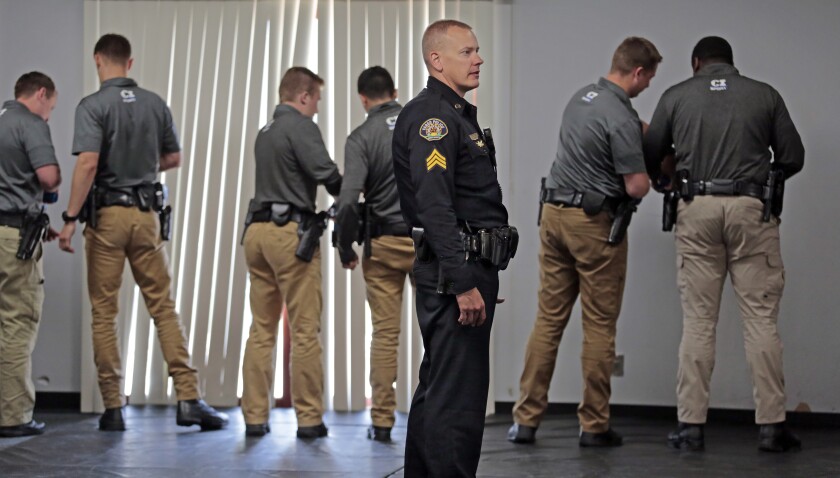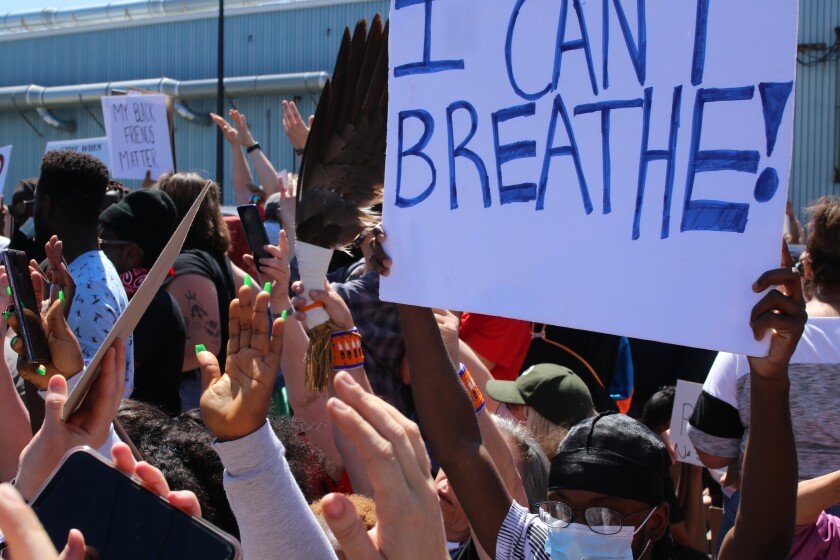FARGO — In his 15 years of policing and training officers, Fargo Sgt. Mike Sanden has never taught officers to use a chokehold on suspects.
“It’s something that is so far out of our realm of defensive tactics that it isn’t listed in our curriculum,” he said, calling the tactic dangerous.
It's a common theme in the Fargo-Moorhead area. Police departments and sheriff’s offices here do not have policies explicitly banning chokeholds, but they don’t train officers to perform them either.
The Fargo and Moorhead police departments say they don't plan to ban chokeholds anytime soon, even as a movement to do so has gained traction across the U.S. and around the world after George Floyd's death in Minneapolis police custody. Floyd died May 25 after an officer knelt on his neck for several minutes. Bystander video captured Floyd telling police, "I can't breathe."
ADVERTISEMENT

Minnesota Gov. Tim Walz urged state legislators to take up the ban on chokeholds as they began a special session last week. Congress also is weighing in, with both Democrats and Republicans announcing intentions to reform law enforcement policies.
North Dakota Gov. Doug Burgum does not have any plans to propose a ban on the tactic, at least not without first discussing it with state legislators, law enforcement and other stakeholders, said governor's office spokesman Mike Nowatzki.
Fargo Police Chief David Todd likely won’t propose any policy changes in the coming weeks since he is retiring at the end of July, department spokeswoman Jessica Schindeldecker said.
There's no way to write policy for every situation police face, but Fargo takes seriously training its officers to only use force when necessary, Sanden said.
Moorhead Police Chief Shannon Monroe says he has no plans to list chokeholds as a prohibited method in department policy.
Sgt. Scott Kostohryz, who's been with the Moorhead Police Department since 1994, noted that training for some officers elsewhere in the U.S. involves a lateral vascular neck restraint, which restricts blood flow and forces a person to pass out.
ADVERTISEMENT
“Our department has never allowed that to be a maneuver that we would have our officers train on,” Monroe said. “We never felt comfortable with that particular maneuver because, if someone isn’t highly trained in it, it is easy to injure somebody.”
Both Minnesota and North Dakota have state laws that say when use of force is necessary and reasonable. Neither mentions chokeholds or vascular restraints.

Sgt. Derek Arndt of the North Dakota Highway Patrol is a training officer for the state Law Enforcement Training Academy in Bismarck. The academy helps cadets build skill sets to simulate dealing with different situations, Arndt said.
Chokeholds, however, are not a part of training, he said.
“We are very conscious of the neck and all of the components of the neck,” Arndt said. “All of those are very sensitive areas. That is a constant teaching point, a training point throughout all levels of use of force.”
Related:
ADVERTISEMENT
- Minneapolis city councilors say they want to disband the police. But what does that mean?
- In wake of Floyd unrest, Fargo schools to prioritize racial equity, inclusion: 'We have work to do'
The 1989 U.S. Supreme Court decision on Graham vs. Connor, which ruled necessary and reasonable use of force must be judged based on the perspective of a well-trained, on-scene officer, has been used as a guideline for officers, Moorhead Police Capt. Deric Swenson said.
“It’s not a free ride for a cop,” he said.
Sanden said officers have to know from a legal standpoint what is reasonable and necessary. They have to ask themselves what a jury would view as reasonable, he said.
“The job of a police officer is really quite complex when you think about it,” he said.
Some local agencies have posted information about their use of force policies online in recent weeks, including the Fargo Police Department on its website .

Related:
ADVERTISEMENT
-
Fargo man accused of threatening to kill police at George Floyd rally In separate cases, prosecutors charge others in connection with May 30 downtown riot.
-
Defund Fargo-Moorhead police? This group is talking about it
Sens. Amy Klobuchar and Tina Smith of Minnesota joined fellow Democrats last week in supporting the Justice in Policing Act, which would include a nationwide ban on chokeholds, along with a number of other changes.
“These are steps we need to take in Minnesota, and in every state across America,” Smith said in a statement. “We all must rise to the call to action, and these changes are long, long, long overdue.”
Rep. Collin Peterson, a Democrat who represents much of western Minnesota, did not respond to an email seeking comment on this story.
North Dakota’s Congress members, all Republican, agreed something needs to change in policing, but they hesitated in supporting a nationwide ban on chokeholds. Sen. John Hoeven said the Democrats' bill goes too far in federalizing enforcement.
“I’m not entirely comfortable with Congress as a whole micromanaging this stuff, but I do think that we should have standardized best practices for use of force,” Rep. Kelly Armstrong said, adding that he wants to see more de-escalation training.
Sen. Kevin Cramer said it’s possible he could end up supporting a ban once he learns more about it, but for now, he prefers the approach of offering guidelines and incentives for good behavior.
“What I don’t want to do is handcuff our cops,” he said.









